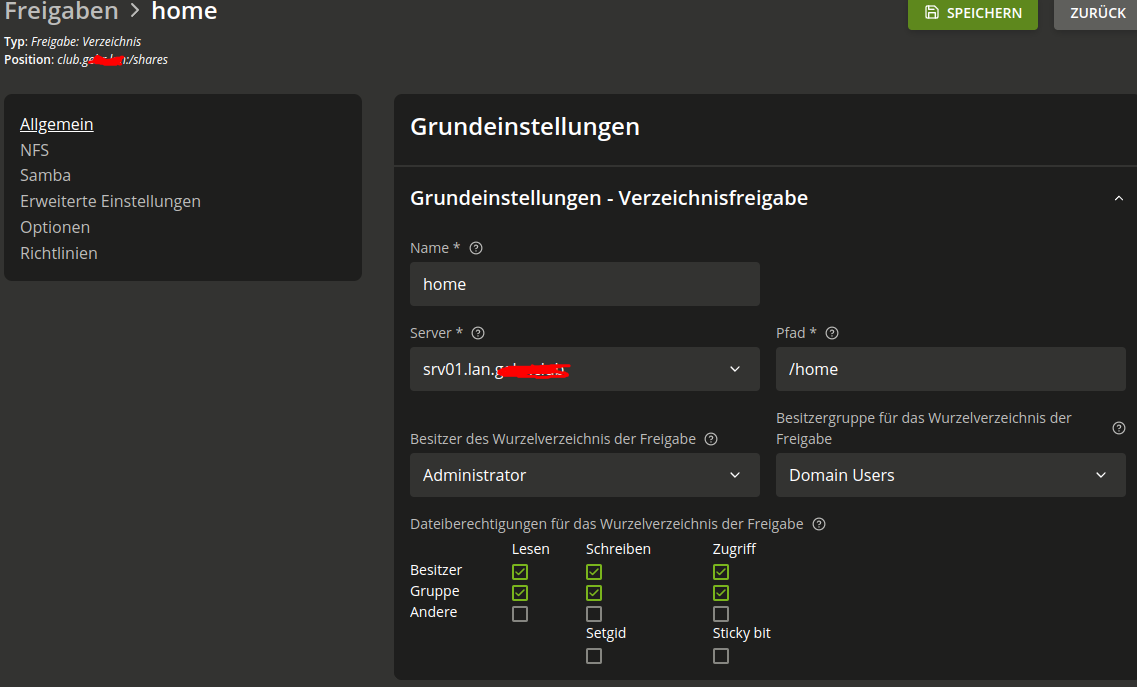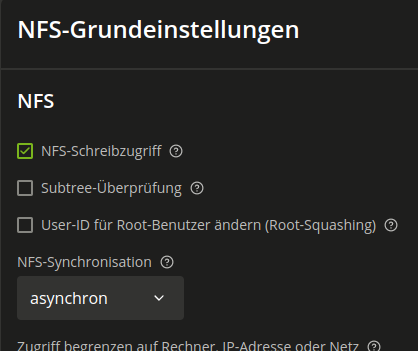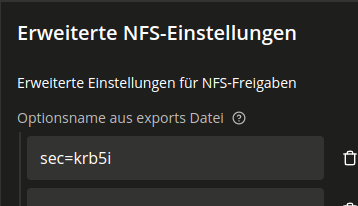Without warranty. Perform a backup beforehand. Perhaps an expert can still say something about it.
I use Linuxmint 20.03 (Edge) with kernel 5.13. Add Linux users to the ‘users’ group.
Starting from a new UCS 5.0.1 installation with ADS installed, I proceeded as follows:
Create share for /home



Manual editing of /etc/exports was no longer necessary.
Enable svcgssd
systemctl unmask rpc-svcgssd.service
ln -sf /lib/systemd/system/rpc-svcgssd.service /etc/systemd/system/rpc-svcgssd.service
configure idmapd
cp /etc/idmapd.conf /etc/idmapd.conf.org
nano /etc/idmapd.conf
[General]
Verbosity = 0
Pipefs-Directory = /run/rpc_pipefs
Domain = lan.example.club
[Translation]
GSS-Methods = static,nsswitch
[Static]
PC001$@LAN.EXAMPLE.CLUB = root
[Mapping]
Nobody-User = nobody
Nobody-Group = nogroup
The static mapping PC001… is necessary for me because I use a real root-account (not sudo) on the client. If I leave out the mapping I have no rights on the share after su.
SPN account for NFS
/usr/share/univention-samba4/scripts/create_spn_account.sh --samaccountname "nfs-$HOSTNAME" --serviceprincipalname "nfs/$(hostname -f)" --privatekeytab nfs.keytab
ktutil copy /var/lib/samba/private/nfs.keytab /etc/krb5.keytab
kinit Administrator
net ads enctypes set "nfs-$(hostname)"
reboot
Linux Mint
Starting from a new installation. I perform the configuration of the client via SSH from another computer.
nano /etc/profile
Add at the end:
xhost si:localuser:root
Is necessary for me (real root). Otherwise GUI programs that request root rights do not start.
nano /etc/systemd/timesyncd.conf
...
[Time]
NTP=srv01.lan.example.club
FallbackNTP=0.de.pool.ntp.org 1.de.pool.ntp.org 2.de.pool.ntp.org
ADS Join
apt install nfs-common libpam-mount ntpdate git realmd libnss-sss libpam-sss sssd sssd-tools adcli oddjob oddjob-mkhomedir packagekit krb5-user krb5-auth-dialog cachefilesd cifs-utils
→ Default realm for Kerberos version 5: LAN.EXAMPLE.CLUB
nano /etc/default/nfs-common
...
NEED_IDMAPD=yes
NEED_GSSD=yes
git clone https://github.com/fbartels/UCS_domain_join.git && cd UCS_domain_join && bash setup.sh
What is the Kerberos realm? (dom.example.com)?lan.example.club
What is the domain controllers short hostname ? ('dc' part of dc.dom.example.com)? srv01
What is the domain admin username? Administrator
Creating computer account on srv01.lan.example.club UCS server. Password for domain admin will be prompted.
Password:[rootPW]
Passwort für Administrator:[rootPW]
Add a domain user to local sudoers? Y/N: N
UCS Domain Join Complete! REBOOT NOW? [y/N] N
I answered the question about “sudors” with “no” because … real root
cp /etc/sssd/sssd.conf /etc/sssd/sssd.conf.org
nano /etc/sssd/sssd.conf
[sssd]
domains = lan.example.club
config_file_version = 2
[domain/lan.example.club]
default_shell = /bin/bash
krb5_store_password_if_offline = True
cache_credentials = True
krb5_realm = LAN.EXAMPLE.CLUB
realmd_tags = manages-system joined-with-adcli
id_provider = ad
fallback_homedir = /home/%u
ad_server = srv01.lan.example.club
ad_domain = lan.example.club
use_fully_qualified_names = False
ldap_id_mapping = True
ldap_schema = ad
access_provider = ad
ad_gpo_access_control = permissive
auth_provider = ad
chpass_provider = ad
access_provider = ad
dyndns_update = true
dyndns_refresh_interval = 43200
dyndns_update_ptr = true
dyndns_ttl = 3600
ldap_schema = rfc2307bis
ldap_group_member = uniqueMember
ldap_group_nesting_level = 2
enumerate = True
cp /etc/idmapd.conf /etc/idmapd.conf.org
nano /etc/idmapd.conf
Exactly the same as on the server (see above).
nano /etc/default/cachefilesd
Activate this line:
secctx system_u:system_r:cachefiles_kernel_t:s0
kinit Administrator
reboot
With the users who work with Linux clients log in once via SSH on the master so that the home directory is created.
Test und Login
As root Test the mount:
showmount -e srv01.lan.example.club
mount -t nfs4 -o sec=krb5i srv01.lan.example.club:/home /home
PAM Mount
I only mount the /home via NFSv4. All other shares via SMB. Why?
The Linux desktop behaved very strangely when the /home is on an SMB share.
From the SMB share I write from the client with ~130 MB/s … NFSv4 “only” 95 MB/s
We work with the shares on group level. I force on the server that files/directory with: Adminstraor / [Group] are written.
mkdir -p /data01/Bilder /data01/Buchhaltung
nano /etc/security/pam_mount.conf.xml
<volume user="*" fstype="nfs4" sec="krb5i" server="srv01.lan.example.club" path="/home/%(DOMAIN_USER)" mountpoint="/home/%(DOMAIN_USER)" options="rw,nolock,nocto,soft,fsc,_netdev,exec,nosuid"/>
<volume fstype="cifs" vers="3.1" sec="krb5i" pgrp="domain users" path="//srv01.lan.example.club/Bilder" mountpoint="/data01/Bilder/" cruid="%(USERUID)" options="fsc,iocharset=utf8" />
reboot an desktop-login
s.me ツ pc001:~ uname -r
5.13.0-27-generic
...
s.me ツ pc001:~ mount |grep srv01
srv01.lan.example.club:/home/s.me on /home/s.me type nfs4 (rw,nosuid,relatime,vers=4.2,rsize=1048576,wsize=1048576,namlen=255,soft,nocto,proto=tcp,timeo=600,retrans=2,sec=krb5i,clientaddr=192.168.83.140,fsc,local_lock=none,addr=192.168.83.5,_netdev)
//srv01.lan.example.club/Bilder on /data01/Bilder type cifs (rw,relatime,vers=3.1.1,cache=strict,username=s.me,uid=1381401120,noforceuid,gid=1381400513,noforcegid,addr=192.168.83.5,file_mode=0755,dir_mode=0755,iocharset=utf8,soft,nounix,serverino,mapposix,fsc,rsize=4194304,wsize=4194304,bsize=1048576,echo_interval=60,actimeo=1)
Best regards
Sven



